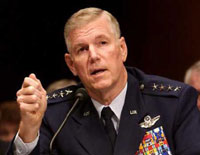Washington tangled up in its assessments of the war in Iraq
 "The insurgents in Iraq launch from 50 to 60 attacks a day," said Gen. Richard Myers, Chairman of U.S. Joint Chiefs of Staff.
"The insurgents in Iraq launch from 50 to 60 attacks a day," said Gen. Richard Myers, Chairman of U.S. Joint Chiefs of Staff.
He was speaking at a briefing in the Pentagon this Tuesday. The general sounded quite pessimistic while speaking about the combat capabilities of the enemy. "They have now mostly the same capabilities as they had last year," said he.
The general's comments are in disagreement with an optimistic assessment of the current situation in Iraq which was unveiled by U.S. President George W. Bush last week in Ford Hood, a military reservation in Texas. President Bush said that the war in Iraq was successfully reaching a new stage thanks to a significant increase in the number of Iraqi troops operating on the ground. Now that there are more Iraqi troops than American soldiers, it is the Iraqis that will be mostly involved in military operations against the insurgents, according to Mr. Bush. Perhaps Gen. Myers revealed some classified information when he said that 159 thousand of the Iraqi army and security forces personnel had been trained thus far. 140 thousand American troops are still deployed in the country.
However, there has been some change for the better in Iraq in terms of the military situation, according to Gen. Meyers. These days local residents are more willing to tip off the coalition forces on the movements of insurgents. U.S. troops used a tip when they tried to capture America's biggest bugbear, Abu Musab Zarqawi, a Jordanian jihadi with links to al-Qaeda. But the terrorist managed to escape that time.
Both Gen. Myers and his boss, U.S. Defense Secretary Donald Rumsfeld, made it quite clear that under the circumstances U.S. administration would rather expect the situation to turn for the better when "political progress" goes under way in Baghdad i.e. when an efficient new government becomes fully operational. "The Iraqis themselves should overpower the insurgents, and they will use military methods combined with political success for achieving the goal," said Mr. Rumsfeld.
U.S. administration is particularly concerned about the political difficulties of the new Iraqi authorities. Only yesterday the leaders of the main factions in the new Iraqi parliament finally agreed on the allocation of top jobs in a coalition government. Prime Minister Ibrahim al-Jaafari drew up a list of 33 ministers. Iraq’s Presidency Council reportedly approved his proposal yesterday. The majority of ministries including the Interior Ministry will be headed by Shias. The Kurds will take over 9 ministries including the Foreign Ministry and Ministry of Planning.
Sunnis will run 6 ministers including the Ministry of Defense. Now the cabinet is to be approved by the parliament. The delay caused by the formation of a government poses a threat to a timetable for drawing a new Iraqi constitution which should be completed by August and approved by a referendum in October this year. The Americans also fear that the new authorities may remove Ilyad Allawi's supporters from the top ministers. According to the Americans, those supporters "are essential" for conducting successful combat operations against the insurgents.
Artur Blinov
 "The insurgents in Iraq launch from 50 to 60 attacks a day," said Gen. Richard Myers, Chairman of U.S. Joint Chiefs of Staff.
"The insurgents in Iraq launch from 50 to 60 attacks a day," said Gen. Richard Myers, Chairman of U.S. Joint Chiefs of Staff. 
 "The insurgents in Iraq launch from 50 to 60 attacks a day," said Gen. Richard Myers, Chairman of U.S. Joint Chiefs of Staff.
"The insurgents in Iraq launch from 50 to 60 attacks a day," said Gen. Richard Myers, Chairman of U.S. Joint Chiefs of Staff. 